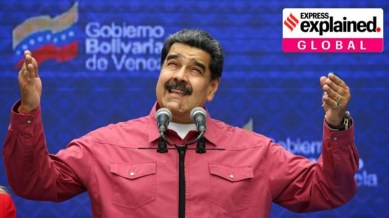Why Nicolas Maduro’s re-election has triggered protests in Venezuela, criticism abroad
Neighbours of Venezuela have issued mixed reactions. Maduro’s long-term allies, Cuba, Bolivia and Nicaragua welcomed the result.

Violent protests have begun in Venezuela after incumbent President Nicolas Maduro was declared re-elected in the election held on July 28.
The National Electoral Council announced on Monday that Maduro had secured 51% of the vote, with opposition candidate Edmundo González Urrutia winning 44%.
monthly limit of free stories.
with an Express account.
However, individual numbers from the 30,000 polling booths are yet to be released, raising concerns about the credibility of the results and hampering the opposition’s ability to verify the result. González had led in independent polls and in exit surveys conducted on Sunday.
The opposition, led by María Corina Machado, has alleged electoral fraud, while the government has threatened to crack down on opposition leaders. What is happening in Venezuela, and why?
Current political scenario
Under the 1999 constitution of the Bolivarian Republic of Venezuela, all executive power is centred in the hands of the directly elected President, who is both the Head of State and Government.
An amendment in 2009 removed the President’s six-year term limit and allowed the incumbent to remain in power in perpetuity.
Elections are periodically held for the post of President and for the National Assembly and regional governments, but the Socialist Party has a general stranglehold on power at all levels.
In July 2023, Maduro banned opposition leader Machado from holding public office for 15 years, which effectively disqualified her from contesting against him following which Gonzalez was chosen as the opposition candidate for President.
Over the years, there have been allegations of government interference in Venezuela’s courts and the National Electoral Council. The media is tightly controlled, and journalists who are critical of the government face harassment or legal action.
The President controls all major industries and economic resources, including oil, electricity, telecom, and steel production. The military is a close ally of the President, and high-ranking military officials hold key positions in the government. This symbiotic relationship dates back to 1992 when tank commander Hugo Chavez, who would later become President, led an uprising against the deeply unpopular austerity government. The armed forces have since suppressed several popular protests against the government.
Why Venezuela matters
Venezuela has the world’s largest share of proven oil reserves, at 303.3 billion barrels or 18% globally, as per the BP Statistical Review of World Energy, 2019. The state-owned oil company, Petróleos de Venezuela, S.A. (PdVSA) is directly controlled by the President.
After becoming President in 1998, Chavez rode on the oil boom of the early 2000s, which reportedly added a trillion dollars to the treasury. The government dramatically increased spending on social welfare, which shrank unemployment and poverty rates by half between 1999 and 2009, widened and improved education, and raised Chavez to legendary status among Venezuelans.
The concentration of power in the hands of the executive and the drastic curtailment of freedoms and democratic rights attracted American sanctions against the Caracas regime. Under President Donald Trump, the scope of the existing sanctions was widened.
In September last year, the Biden administration moved to ease some sanctions for six months in exchange for the Maduro government allowing a more democratic election, releasing political prisoners, and lifting restrictions on opposition politicians.
Indian oil imports from Venezuela had dropped off during 2020-23 following the US sanctions, but picked up from the end of last year after some curbs were temporarily lifted. In December 2023 and January 2024, India became the world’s top buyer of Venezuelan crude.
From Chavez to Maduro
Chavez handpicked Maduro to be his successor in 2011. Maduro inherited a government that had specialised in oil production without diversifying the economy, and was heavily reliant on imports for basic goods and services, including food and medicine.
The crash in oil prices in 2014 sent the country’s economy into deep crisis, marked by hyperinflation and shortages of essential goods. Between 2013 and 2016, food imports fell by 71% and medicines and medical equipment by 68%, while infant mortality increased by 44% according to data reported by the Centre for Strategic and International Studies.
The rate of inflation shot up from 255% in 2016, the year before the US sanctions were imposed, to a million per cent in September 2019, the data show. Maduro has blamed the sanctions for the economic crisis in his country.
In 2022, the UN estimated that 7.1 million Venezuelans had fled the country since 2015, more than 80% of whom had migrated to other countries in South America and the Caribbean.
Global reaction to polls
THE US has condemned the alleged attempt at election fraud in Venezuela. Secretary of State Antony Blinken said, “We have serious concerns that the result announced does not reflect the will or the votes of the Venezuelan people.”
RUSSIA & CHINA have welcomed the election result. President Xi Jinping congratulated President Maduro on his re-election, and President Vladimir Putin reaffirmed the continued cordial relations between Venezuela and Russia.
NEIGHBOURS of Venezuela have issued mixed reactions. Maduro’s long-term allies, Cuba, Bolivia and Nicaragua welcomed the result.
Brazil and Mexico welcomed the peaceful voting. But Argentina, Chile, Colombia, Peru, and Costa Rica have rejected the outcome.
After nine Latin American countries called for an emergency meeting of the Organization of American States permanent council expressing “profound concern” over the result, the Venezuelan government has severed diplomatic ties with them.
EU & UK have raised questions over the validity of the results and stressed the need for transparency in the electoral process, with detailed counting of votes and access to voting records being made available to all.